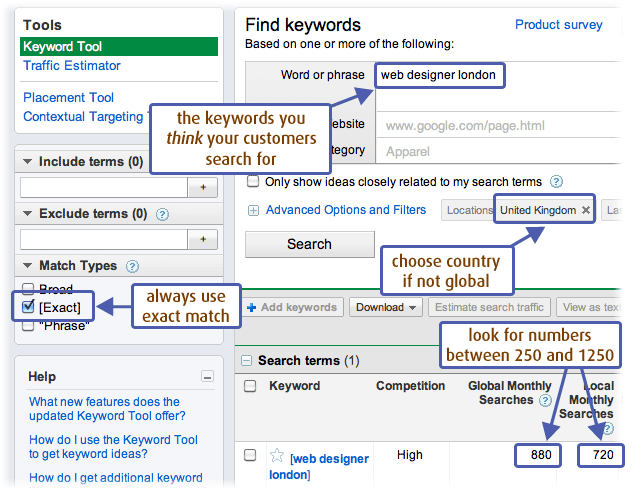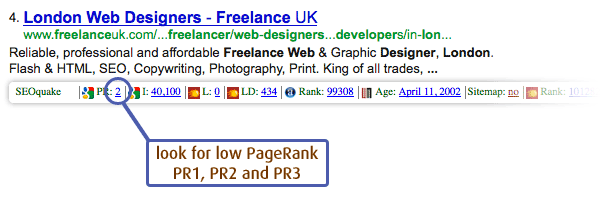How do you get your website in front of as many eyeballs as possible? How do you expose your products and services to the world? The answer is, of course, to get to the top of the Google search results.

Keyword research and competitor analysis
Don’t stop reading just because it’s a boring subheading!!! This is actually very exciting, because you can find out how many people search for particular phrases on Google! I was amazed when I discovered this, but maybe that’s just me. 🙂 Watch this video:
The above video shows you how to use Google’s keyword tool and SEOquake to find the best phrases to attract the most visitors. What do you think of the new video intro? Cheesy, eh?
The Google keyword tool
When it comes to SEO, the first thing you need to do is keyword research. This is an absolutely essential stage in the early lifecycle of an online business.
Don’t just guess what people are looking for – research it! Use the Google Adwords Keyword Tool to tell you how many people make certain searches every month.
This tool can help you analyse the demand for your products or services. Also, this tool can tell you the exact words your potential customers are using to search for businesses like yours.
So, in the example of the video, let’s say I’m a web designer in London, I should see how many searches are being made every month for those exact words.
As you can see from the image below, the exact words “web designer london” are searched for 880 times every month in Google. I’m always amazed by how accurate these results are! You can guarantee that there will be around 880 people searching for “web designer London” this March, this April, this May… etc.
How do I know how accurate this is? Because, if you hit the top spot you can guarantee about 30%-60% of that traffic, and when that happens the same amount of traffic comes in every month – almost as regularly as clockwork! (Of course, not if it’s a seasonal search term like “halloween costumes”.)

So, now that you understand exactly how powerful this tool is, there are some Google Keyword Tool tips:
- Always use [Exact] Match Type, not Broad (annoyingly the default) nor “Phrase”
- Choose the country you’re interested in for the Local Monthly Searches, otherwise just look at Global Monthly Searches
- Look for the “low hanging fruit”, monthly visitors in between 250 and 1250 (or ideally between 500 and 1000) because they have a decent search volume and are unlikely to have high competition
- Whilst looking at the suggestions for other keywords, you can order them by number of searches by clicking on the top of the search columns
Now that you, hopefully, have a few keyword ideas to target, it’s time to checkout the competition.
Keyword competitor analysis
The first thing you need to do, if you haven’t already, is to download the SEOquake add-on for Firefox. I would add here that I personally don’t use it on my main browser. This is because it does slow browsing down while it gets all the juicy information. After installing it go Tools > SEOquake > Preferences > and cut down the number of Parameters it shows – this’ll speed things up.

Look for the first parameter – the Google PageRank. If you’re looking down the top ten Google results and you see a load of PageRanks of 2’s, 1’s and 0’s, then bingo! You’ve got a keyphrase you can target!
Please be aware that Google PageRank isn’t the be-all-and-end-all measurement of the importance of pages. Try to look at other parameters such as how many links competitors’ sites have going into them. And, some results will be there because their on-page SEO is better for that particular search. This isn’t an exact science, but it’ll give you a good start when analysing your main competitors online.
You are looking for two things: first, a decent number of monthly searches with the Google Keyword Tool, and second, nice easy competition.
If you have found a few keyphrases you’d like to target you can move onto the next stage.
On page SEO
If you want your home page to get to the top of Google for “web designer London” then you have to optimize that page for the words “web designer London”.
You can do this by adding the phrase to the heading, title, first paragraph and body text of the page.
Build links to the page with the keywords in the anchor text
Of course, we all know the value of getting links to our site. But when targeting certain keyphrases, it’s necessary to get some of those links pointing to you with the keywords in the anchor text. Like this (where “web designer London” is our targeted keyphrase):
<a href="https://robcubbon.com">web designer London</a>
But, don’t over do this! Don’t get hundreds of links pointing to your site with the same anchor text as that looks unnatural. Mix up the wording of the anchor text and be sure to include links with anchor text “click here” and “find out more about”. Include links with the domain as the anchor text. Link to the internal pages not just the home page. With new sites be especially careful not to “over-optimize” both the on-page and off-page SEO.
The above has been re-written to accommodate the changes made in April 24th to Google’s algorithm, call “Penguin”. This advice still holds out but avoid building too many links and make them look “natural” in terms of anchor text.
Blogging, Relationships and Content Marketing
Obviously I can’t cover all the good practices needed in content creation and link building in this one post. I would always advise anyone with a website to start a WordPress blog as it is good marketing for your brand. Set up WordPress with SEO in mind. Make sure to write your blog posts in an SEO-friendly manner.
Form relationships with other bloggers in your niche. Help them promote their posts and they will help you promote yours.
All this blogging activity together with the above targeting strategy will pull in massive long tail search traffic connected to your target keywords.
I should mention at this point that good content will get you good links and good search engine rankings. It’s the ultimate technique that pretty much trumps all of the above!
You can do it!
Do you have a set of keywords you target for your home page? If you don’t, head over to the Google Keyword Tool to find some low hanging fruit!
Are you aware of your competition? If not, get the SEOquake add-on and check out the competition on a search term that describes your business. Can you beat ’em? If so optimize the page and build some links to it. It’s surprisingly easy – just a few good links can make a lot of difference. But don’t over-egg the pudding. Find out more about how to get great clients for your business in my e-book.
Now, this is a thorny subject and I’m bound to have rubbed some SEO-types up the wrong way. So, I would love to hear you opinions in the comments. Be nice! Oh, and vote for the article if you liked it!

actually I am not sure that I agree on “Always use [Exact] Match” since google is starting to notice that people are doing that.. At the same time you are only trying to get one phrase of the tail.
Let’s say you want to get the tail of “songs”
if you use phrases like “lovely songs” and “better songs” “my love songs” etc. this way you will still tell google what it is all about.. but the great things is.. you will get more keywords.. the tail offend doesnt have the highest competition and you could get ranking for more words..
PR Rank doesn’t measure the competition on a keyword or a keyword phrase, but only the trust for a page.
Be aware that not all pages on a domain has the same pagerank. and even though it has a high pagerank doesn’t mean you can’t out rank it.. and even though the pagerank is low. it still could be hard to get to the top of SERP
I would have to agree with Rob on using Exact match.
Sure, you are right, you will eventually want to rank for long tails too. Specifically with authority sites you will get a lot of (sometimes unexpected) longtails over time, and you should try to backlink for some of the obvious alternate searchs (your lovely songs, my songs etc.)
But for research purposes, exact match will tell you what you will get up front if you rank, not “down the road”. This makes it the most important metric. Sure you may get a lot of longtails in the end (and that is great). But you need to know what you will get AT A MINIMUM and what it will take to get that ranking for the main keywords.
Good to see you hear again, Steve, I hope all is well with you. I always think that if you get the exact match targeting right first then the longtails will take care of themselves.
Hello Justian, thanks for your comments. This was meant to especially help people ranking their home page for keywords that describe their business and I’ve changed it a bit so that is more clear now.
So, I think Exact match is the way to go for targeting here.
Yeah it’s a bit more clear now. and that makes my first comment irrelevant.
even though I do thing people tend to put to mush into “pagerank”. but as you also mentioned inbound links and other key metrics like on-page SEO plays a huge role here.
other then that a great blog post 🙂
Thanks, Justian, valid comments. All helps to demystify this very difficult area.
Hay thanks for this Rob. I just watched the whole video with the dodgy ‘muzak’ style soundtrack, hehe. No seriously, the vid was worth watching. Even though I’ve been using the keyword tool for years, I always stayed clear of the search terms that had high competition. I didn’t know this was just for adwords! Now I feel a bit thick, but thanks for pointing this out…
Oh, it was only a few weeks ago when I finally worked out what that competition was and I’ve been using the keyword tool for ages too. It’s the amount of competition amongst advertisers for that keyword so nothing to do with the competition you will face from other sites in the SERPs.
HI
One area where the competition figure is important is in adsense affiliate sites. You want a high competition as that means people are bidding against each other and the CPC will be higher than otherwise.
This is a good thing in adsense as we get paid a percentage of the ACTUAL CPC. The figure shown here (for cpc) is just an indication.
I’d challenge you 50-70% of traffic figure I think thats just because of your niche.
Typically 40% or less is the norm and some niches show 30%.
regards
Thanks for your input on that, Steve. I’ve changed the traffic percentage in the article. But whatever the percentage is, the point is that it’s the same month after month after month. The same amount of different people will do the same thing at a regular rate – freaks me out a bit! 😉
Thanks again Rob, for making an intimidating subject considerably more understandable. Knowledge is power, and I thank you for sharing. What do you think of WordPress Scribe (subscription service, mega dollars, but I hear it’s great)?
Thanks again, George. I’m not sure whether I need to invest time and money into Scribe. I respect the people behind it but I think it only helps you employ SEO best practices that you should be doing anyway. It recommends sites and Twitter users to schmooze into giving you links but it doesn’t actually give you links. It also has a very good affiliate scheme (so lots of people will say it’s great!). So, I won’t be rushing out and buying it at the moment.
You have not only explained very successfully and in plain English a subject which makes many people turn their eyes, but also have put it on a video to make the content even more easy to digest. I have used Google Keyword tool in the past actually pretty much to check out volume of searches, but have never actively pursued writing articles to actually match with this results. What I really would like to see you talking about, perhaps in a future video as well, is how you go on building the links to position your page exactly where you want them to be. That would be great!
Thank you, Ray. You’re absolutely right, I should write more about link building. It’s a huge topic. I did write a very general article on how to get links to your website a couple of years ago. But I could do a better one now. 🙂
This is exactly the sort of thing I need. SEO is a bewildering subject for a noob like me, and a step by step explanation like this is perfect. I’ve already downloaded SEO Quake and have using Google’s Adwords to tweak my keywords. Thanks again for the hand!
No problem, George. Glad it helped.
Hi Rob
Thank you for posting (yet again) a very helpful and instructive article which assists people to find their way through a maze. I do not have sufficient knowledge to understand, therefore comment on, the points raised by your obviously very informed correspondents. However, I can speak with the authority of a newbie that your article was interesting and provided the very thing we need – easy-to-follow step-by-step ‘How to’. The lively discussion shows your articles are great for both experienced website owner/operators and those of us just starting out.
Cheers from Caitlin in South-East Queensland
Thanks a lot, Caitlin, your encouraging words mean a great deal. I really hope this is helpful to seasoned pros and those just starting out. You really can do this when you’re starting out and it will help you choose the right words to target right from the get-go.
Nice post Rob. Your detailed breakdown for newbies on how to navigate the Google Keyword tool is really good. I think the global and local call-outs are great.
I teach an SEO training class in San Francisco, and one of the big caveats I mention during the class regarding the keyword tool, is that search volumes are better used as relative indicators. For example, if keyword “a” has 1,000 queries per month, and keyword “b” has 2,000 per month, I wouldn’t necessarily be confident that keyword b has 2,000 queries, but I think it would be safe to say that keyword b is searched about twice as frequently as a. I think these search volume numbers are even more dramatic for countries outside of the US, Canada and Western Europe. The keyword data just seems to drop off significantly when you look at queries in LatAm, EMEA or APAC.
Tommy
Hello Tommy, thanks for your input. Actually, that goes along with what I’ve found because sometimes I’ve thought, wow, the keyword tools is really accurate and other times I’ve thought it’s wide of the mark. I’ve read that Google doesn’t want to give out the real data.
Really interesting about LatAm, EMEA or APAC – I’d no idea about that. Thanks 🙂
You have a great engaging style of writing. SEO is something that I need to read up on, but often give up as the articles can be very dry or over technical. Yes I was guessing what my people were looking for, now I’ll research it!
Thanks for all the useful tips.
Jo
Delighted that this has helped you. It’s something I wish I understood properly a few years ago!
Really Boss Awesome post. I think this suggestion is very valuable for who new in blogging. Thanks for share your great post
No problem, Sabbir.
Interesting and informative, thanks as Im literally sitting here working on SEO and related proposal for a client today. Thought Id stop by see what you had for intel.
Glad I did.
thanks!
pd.
Thanks, Peter. Glad it helped. Hope the proposal goes well.
Rob, you’ve done it again! Great article, a useful (nay, essential) topic explained well.
The only criticism I would have is the title. As I’m sure you know, there are many links with variations on “How to get to the top of Google” and 99% of them are scams. I was worried about following this one and it’s only because I have read several articles of yours in the past that I did. On the plus side, this means you’ve established a trust relationship with at least one person (ie. me). On the negative side, you have ironically followed very bad SEO technique in the naming of this article. You have chosen a phrase which not only has a huge amount of competition but also a very high degree of negative association.
Otherwise the article is well up to your usual high standards and I will be recommending it to others, with the caveat of telling them to ignore the title.
With titles, sometimes I think, “oh, what the heck?” and go for a really stupid one. They can catch people’s eyes and do well on social media. The downside is that they can also miss the mark and be left in a pile of rubbish on the side of the internet.
In this case it was a bit of both but mainly the latter.
I am number 7 on google.co.uk for “How To Get Your Business To The Top Of Google” and number 10 for “How To Get To The Top Of Google” so I am pulling in a bit of longtail but not as much as I’d have liked!
The good thing is that this article does seem to have been popular with my readers and new readers alike 🙂 thanks, Hendrik, good to see you back here again. I hope you’ll keep coming back in the future!
Great article, I am trying to learn more about seo and this has really inspired me to learn more. I look forward to reading more about integrating seo with WordPress, this is my platform of choice. I am using WordPress seo by yoast’s plugin right now. Do you think that is sufficient or is there more I can do?
Thanks.
Thanks Brett, really the best thing is to concentrate on writing good content that addresses the concerns of your target audience. I have written more about the settings in Yoast’s WordPress SEO here. And there are the basic on-site WordPress SEO must-do’s here. Other than that, keep creating content! I hope this helps.
Thanks Rob, I’m hitting the ground running!
Good to hear!